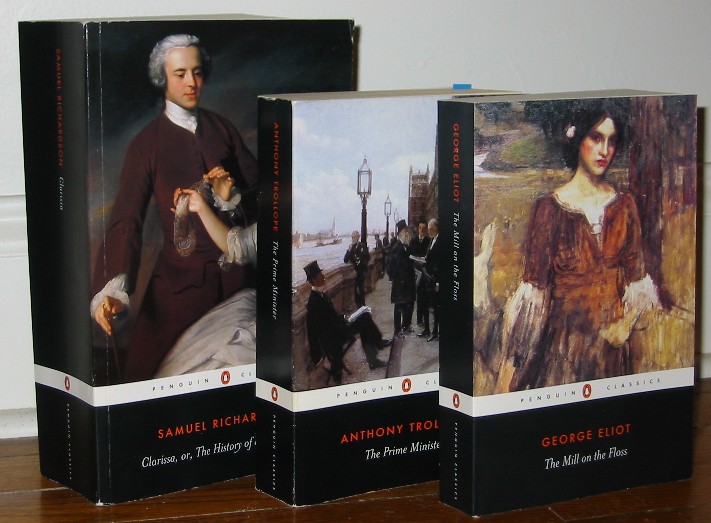My Week with Clarissa: The Concept
July 12, 2007
Roscoe, N.Y.
People actually laugh when they see the Penguin paperback of Samuel Richardson's novel Clarissa (at left). With its larger size and 2½ inch thickness, it makes all other Penguin paperbacks look like baby books:

At 1,500 dense pages and over 900,000 words, Clarissa is traditionally considered to be the longest novel written in the English language. (But see the Longest Novel entry in Wikipedia for comparisons with other massive reads.) Many novels in the 18th and 19th centuries were published in two, three, or sometimes four volumes. When Clarissa was first published in 1747 and 1748, it came out in seven volumes.
I am going to read Clarissa in seven consecutive days. I will begin on the morning of Sunday, July 15, 2007 and (if all goes well) finish sometime in the late afternoon or early evening of Saturday, July 21.
Although Clarissa was quite popular when it was first published, it is not much read now. Many otherwise well-read people haven't even heard of it. My superficial survey of half a dozen Barnes & Noble stores in Manhattan revealed that most of them had a single copy of the Penguin edition that seemed to have been sitting on the shelf for a very long time, periodically handled and thumbed through with amazement, but then replaced.
The book might experience a similar fate after being purchased. I can imagine myself beginning Clarissa with much enthusiasm and even making some headway but then losing inertia. I can imagine the book languishing on the coffee table, getting progressively covered with magazines and newspapers and other books, occasionally peeking out from the mess to mock my inadequate reading habits. We've all been there.
That's the problem I'm going to try to avoid by reading and finishing Clarissa over the course of next week.
Clarissa has no chapters. It is an epistolary novel—a novel composed entirely of letters (epistles)—and there are over 500 of them written during one calendar year. The first letter (to the title character from her best friend, Anna Howe) begins:
-
I am extremely concerned, my dearest friend, for the disturbances that have happened in your family. I know how it must hurt you to become the subject of the public talk; and yet upon an occasion so generally known it is impossible but that whatever relates to a young lady, whose distinguished merits have made her the public care, should engage everybody's attention. I long to have the particulars from yourself, and of the usage I am told you receive upon an accident you could not help and in which, as far as I can learn, the sufferer was the aggressor.
I am not a fast reader, and while I'm comfortable with 19th century novels—I can manage Austen and Dickens and Trollope with no problem, and I find George Eliot easier than Virginia Woolf—like most people (I suspect) I find 18th century prose rather rough going. I doubt I'll be able to read Clarissa much faster than 200 words per minute, and at that rate the entire novel will require 75 hours of reading or about 11 hours per day. If I'm slowed down to 150 words per minute, I'll barely have time for eating.
In other words, reading Clarissa in seven days will be a full-time job! I'm basically on vacation next week, and I've even been telling people that I'll be on a "communication blackout" vacation, but that's not entirely true. I'll still be looking at my email and answering the telephone, but I don't want any major distractions. Anything resembling work will be ignored.
Of course I'll be blogging daily about the experience of reading Clarissa. (What good is reading a 1,500 page novel in seven days if I can't blog about it? — and, as Deirdre reminds me, to brag about it?)
I am most interested in the following questions: Can Clarissa speak across 250 years to a modern reader? Will it provoke an emotional response in me? (It sure did among its contemporary readers!) Will I be able to enter the minds of the characters and come to intuitively understand 18th century values and attitudes?
What will this full-time immersion in Clarissa do to my mind? Will I start thinking in 18th century prose? Will I be able to carry on a normal converstion? After a full day of reading Clarissa will I still be able to watch a Scrubs rerun from bed before retiring for the night? Will I have Clarissa dreams? (I certainly hope so!)
I am not very concerned about whether I'll "like" or "dislike" the novel. For a novel as old as Clarissa and as important to its contemporary readers, my personal likes or dislikes are pretty much irrelevant, even to myself.